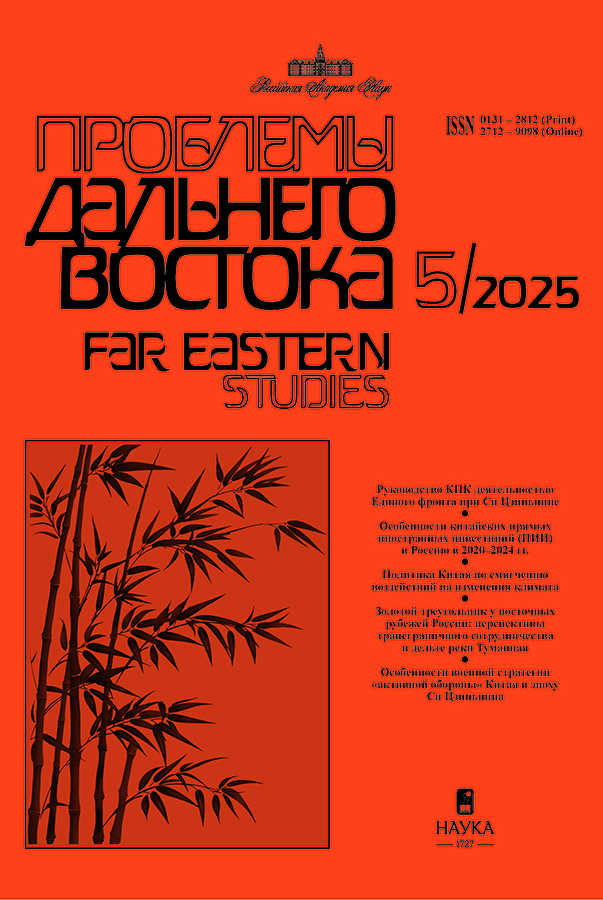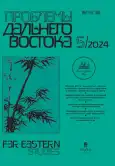China's Approach to “Reset” System of Global Economic Governance in the Context of Structural Power Theory
- Authors: Ramich M.S1
-
Affiliations:
- Peoples’ Friendship University of Russia named after Patrice Lumumba
- Issue: No 5 (2024)
- Pages: 5-24
- Section: Politics
- URL: https://gynecology.orscience.ru/0131-2812/article/view/676244
- DOI: https://doi.org/10.31857/S0131281224050012
- ID: 676244
Cite item
Abstract
Globalization, which contributed to the maintenance of the neoliberal world order, slowed down after the Asian Financial Crisis in 1998 and the World Financial Crisis of 2008, when the existing system of global economic governance was unable to support developing countries, strengthening the trend towards regionalization and localization. China, acting as a rising power in the process of “power transition,” has focused its efforts on transforming the system of global governance that has so far provided US hegemony. While initially successfully using globalization for integration into the world economy, China has changed its role in the system of global governance and has become empowered to establish and maintain new global governance structures. China adopted a strategy of expanding its activities in traditional international institutions (UN, WB, IMF) and establishing parallel international institutions (BRI, AIIB) to push forward its perspective of the world order. The US adopted a strategy of decoupling to limit Chinese capabilities in its sphere of influence in response to China's economic rise. On the one hand, this led to the emergence of trade and techno-economic blocs, but on the other hand, China's approach preserved the possibility of participation in its institutions for countries which are considered to be the “core” of the existing economic order (G7, G20, OECD). The author concludes that in the present context China adheres to a non-conflict asymmetric approach to reforming the system of global governance in the economic sphere, which implies global distribution of norms through the UN, G20 and BRICS and re-globalization of global trade through intensification of regional cooperation with Asian, African and Latin American countries within the framework of the BRI, forums for cooperation between regional organizations and China, and integration of developing countries into parallel financial institutions.
Keywords
About the authors
M. S Ramich
Peoples’ Friendship University of Russia named after Patrice Lumumba
Author for correspondence.
Email: ramich_ms@mail.ru
ORCID iD: 0000-0003-1479-2785
Assistant Professor, Department of Theory and History of International Relations
Moscow, 117198, RussiaReferences
- Berdsoll N., Fukuyama F. Konsensus posle vashingtonskogo [Post-Washington Consensus]. Rossiya v global'noj politike. 2011. T. 9. No. 2. S. 194–203. (In Russ.)
- Vinogradov A.V. Vneshnij mir v strategii Kitaya posle XX s"ezda KPK [The Outside World in China's Strategy after the 20th CPC Congress]. Problemy Dal'nego Vostoka. 2023. No. 5. S. 90–107. doi: 10.31857/S013128120028043–8. (In Russ.)
- Grachikov E.N., Syuj H. KNR i mezhdunarodnaya sistema: formirovanie sobstvennoj modeli miroustrojstva [China and the International System: The Formation of a Chinese Model of World Order]. Vestnik mezhdunarodnyh organizacij. 2022. T. 17. No. 1. S. 7–24. doi: 10.17323/1996–7845–2022–01–01. (In Russ.)
- Degterev D.A., Piskunov D.A., Eremin A.A. 5G-konkurenciya SSHA i KNR v stranah Latinskoj Ameriki: u istokov tekhnologicheskogo dekaplinga [US and PRC 5G competition in Latin America: at the origins of technological decoupling]. Polis. Politicheskie issledovaniya. 2023. No. 3. S. 20–37. doi: 10.17976/jpps/2023.03.03. (In Russ.)
- Degterev D.A., Ramich M.S., Cvyk A.V. SSHA — KNR: «vlastnyj tranzit» i kontury «konfliktnoj bipolyarnosti» [U.S. — China: “Power Transition” and the Outlines of “Conflict Bipolarity”]. Vestnik Rossijskogo universiteta druzhby narodov. Seriya: Mezhdunarodnye otnosheniya. 2021. T. 21. No. 2. S. 210–231. doi: 10.22363/2313–0660–2021–21–2–210–231. (In Russ.)
- Konkurenciya mezhdu SSHA i KNR: vozmozhnosti dlya Rossii: Monografiya [Competition between the U.S. and PRC: Opportunities for Russia: A Monograph] / Pod red. D.A. Degtereva. M.: Aspekt Press, 2024. 300 s. (In Russ.)
- Larionova M.V., Shelepov A.V. «Gruppa dvadcati», BRIKS i «Gruppa semi» v global'nom ekonomicheskom upravlenii [The G7 and BRICS in the G20 Economic Governance]. Vestnik mezhdunarodnyh organizacij. T. 14. No. 4. S. 48–71. doi: 10.17323/1996–7845–2019–04–03. (In Russ.)
- Leksyutina Ya.V. Kitaj i reformirovanie mezhdunarodnoj ekonomicheskoj sistemy [China and the reform of the International Economic System]. Sravnitel'naya politika. 2018. T. 9. No. 3. S. 26–41. doi: 10.18611/2221–3279–2018–9–3–26–41. (In Russ.)
- Petrovskij V.E. Perspektivy` rasshireniya i razvitiya BRIKS: akademicheskie diskussii v Kitae [Prospects for BRICS Expansion and Development: Academic Discussions in China]. Problemy Dal'nego Vostoka. 2024. No. 2. S. 48–60. doi: 10.31857/S0131281224020047. (In Russ.)
- Salickij A.I., Semenova N.K. Dva kontura: novoe osmyslenie mesta Kitaya v mirovoj ekonomike i politike [Two contours: rethinking China's place in the global economy and politics]. Kommunisticheskij Kitaj. Celi i zadachi k stoletnemu yubileyu KPK: Materialy ezhegodnoj nauchnoj konferencii Centra politicheskih issledovanij i prognozov IDV RAN. M.: IDV RAN, 2021. S. 161–172. (In Russ.)
- Timofeev O.A. Sharipov F.F. Obostrenie kitajsko-amerikanskoj konkurencii po probleme miroporyadka: e`volyuciya vzglyadov kitajskix ucheny`x [Aggravation of China-US Competition on the Problem of the World Order: Chinese Scientists Views Evolution]. Problemy Dal'nego Vostoka. 2023. No. 2. S. 26–40. doi: 10.31857/S013128120025383–2. (In Russ.)
- Almeida F.A.R. Belt and Road Initiative and its Impacts on Latin America’s Regional Integration // The Twelfth International Convention of Asia Scholars (ICAS 12). Amsterdam University Press, June 2022. Pp. 9-17.
- Duggan N. China—The Champion of the Developing World: A Study of China’s new Development Model and its Role in Changing Global Economic Governance // Politics & Policy. October 2020. Vol. 48. No. 5. Pp. 836-858. doi: 10.1111/polp.12377
- Lake D.A. Economic Openness and Great Power Competition: Lessons for China and the United States // The Chinese Journal of International Politics. September 2018. Vol. 11. No. 3. Pp. 237-270. doi: 10.1093/CJIP/POY010
- Mbaidjol N.K. African countries and the global scramble for China: a contribution to Africa’s preparedness and rehearsal: International comparative social studies. Leiden: Boston: Brill, 2019. Vol. 41. 190 р.
- Oloruntoba S. G77+China and Global Governance of Trade and Development // Latin American Report.
- August 5, 2016. Vol. 31. No. 1. doi: 10.25159/0256-6060/427
- Оnis Z., KutlayM. The New Age of Hybridity and Clash of Norms: China, BRICS, and Challenges of Global Governance in a Postliberal International Order // Alternatives: Global, Local, Political. May 2020. Vol. 45. No. 3. Pp. 123-142. doi: 10.1177/0304375420921086
- Paradise J.F. The Role of “Parallel Institutions” in China’s Growing Participation in Global Economic Governance // Journal of Chinese Political Science. April 2016. Vol. 21. No. 2. Pp. 149-175. doi: 10.1007/s11366-016-9401-7
- Park S.C. Mega FTAs and the Indo-Pacific Economic Framework (IPEF) in the Asia Pacific Region: Will It Be Cooperation or Competition? // International Organisations Research Journal. July 2023. Vol. 18. No. 2. Pp. 122-150. doi: 10.17323/1996-7845-2023-02-07
- Paul T.V. Globalization, deglobalization and reglobalization: adapting liberal international order // International Affairs. September 2021. Vol. 97. No. 5. Pp. 1599-1620. doi: 10.1093/ia/iiab072
- Paul TV The Specter of Deglobalization // Current History. January 2023. Vol. 122. No. 840. Pp. 3-8. doi: 10.1525/curh.2023.122.840.3
- Peng B. China, Global Governance, and Hegemony: Neo-Gramscian Perspective in the World Order // Journal of China and International Relations. June 15, 2018. Vol. 6. No. 1. Pp. 49-72.doi: 10.5278/ojs.jcir.v6i1.2363
- Sampson M., Wang J. Status-quo enhancing versus status-quo challenging change in global economic governance: the case of China in finance and trade // International Relations. 2023. Vol. 37. No. 4. Pp. 613-633.
- Stanojevic N., Zakic K. China and deglobalization of the world economy // National Accounting Review. March 2023. Vol. 5. No. 1. Pp. 67-85. doi: 10.3934/NAR.2023005
- Stanojevic N., Zakic K. China and deglobalization of the world economy // National Accounting Review. March 2023. Vol. 5. No. 1. Pp. 67-85. doi: 10.3934/NAR.2023005
- Strange S. State and Markets. 2nd ed. L.: Continuum, 1994.
- Wang Z., Sun Z. From Globalization to Regionalization: The United States, China, and the Post-Covid-19 World Economic Order // Journal of Chinese Political Science. 2021. Vol. 26. No. 1. Pp. 69-87. doi: 10.1007/s11366-020-09706-3
- Zhang K.H. U.S.-China Economic Links and Technological Decoupling // The Chinese Economy. February 2023. Vol. 56. No. 5. Pp. 353-365. doi: 10.1080/10971475.2023.2173399
- 周嘉昕: “全球化” “反全球化” “逆全球化” 概念再考察 [Чжоу Цзясинь Пересмотр концепций «глобализации», «антиглобализации» и «деглобализации»] // 南京社会科学. 2024年. 第4期. 第20–27 页. doi: 10.15937/j.cnki.issn1001–8263.2024.04.003
- 孙建社: 多极化, 全球化, 多样化和国际关系民主化——略论江泽民国际战略思想 [Сунь Цзяньшэ. Многополярность, глобализация, диверсификация и демократизация международных отношений — краткая дискуссия о международной стратегической мысли Цзян Цзэминя] // 南京师大学报(社会科学版). 2003年. 第3期. 第40–45 页.
- 徐秀军: 全球经贸格局重构与高质量共建"一带一路" [Сюй Сюйцзюнь. Реконфигурация глобальных экономических и торговых моделей и высококачественное строительство «Одного пояса, одного пути»] // 当代世界. 2023年. 第9期. 第17–22 页. doi: 10.3969/j.issn.1006–4206.2023.09.004
- 易小丽, 黄茂兴: 中国积极参与G20建设并推动全球经济治理改革的实践变化 [И Сяоли, Хуан Маосин. Активное участие Китая в строительстве G20 и продвижение практических изменений в реформе глобального экономического управления] // 经济研究参考. 2019年. 第24期. 第27–36 页. doi: 10.16110/j.cnki.issn2095–3151.2019.24.005
- 易继明: 后疫情时代 “再全球化” 进程中的知识产权博弈 [И Цзимин. Борьба в сфере интеллектуальной собственности в процессе «реглобализации» в постпандемическую эпоху] // 环球法律评论. 2020年. 第5期. 第163–177 页.
- 苏立君, 葛浩阳: 从经济全球化到 “再全球化” ——基于 “一带一路” 的战略思考 [Су Лицзюнь, Гэ Хаоян. От экономической глобализации к «реглобализации» — стратегическое мышление на основе «Одного пояса, одного пути»] // 财经科学. 2017年. 第10期. 第52–62页.
- 袁堂卫, 张志泉: 逆全球化、再全球化的马克思主义分析 [Юань Танвэй, Чжан Чжицюань Марксистский анализ антиглобализации и реглобализации] // 马克思主义研究. 2019年. 第9期. 第141–150 页.
- 谢浩: 世界发展与中国发展:中国经济全球化的特征与战略选择 [Се Хао. Глобальное развитие и развитие Китая: Характерные черты и стратегический выбор китайской экономической глобализации] // 郑州轻工业学院学报(社会科学版). 2018年. 第2期. 第42–49 页.
- 黄新焕, 鲍艳珍: G20机制下中国参与全球经济治理的政策路径 [Хуан Синьхуань, Бао Яньчжэнь. Политический путь Китая по участию в глобальном экономическом управлении в рамках механизма G20] // 经济研究参考. 2019年. 第24期. 第37–44 页. doi: 10.16110/j.cnki.issn2095–3151.2019.24.006
Supplementary files








